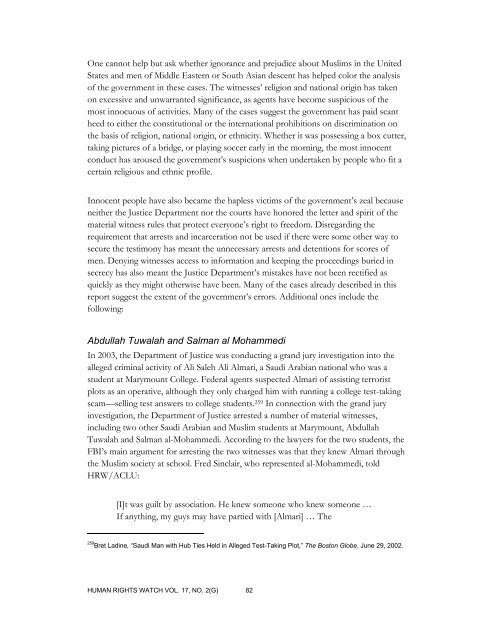Witness to Abuse - Human Rights Watch
Witness to Abuse - Human Rights Watch
Witness to Abuse - Human Rights Watch
You also want an ePaper? Increase the reach of your titles
YUMPU automatically turns print PDFs into web optimized ePapers that Google loves.
One cannot help but ask whether ignorance and prejudice about Muslims in the United<br />
States and men of Middle Eastern or South Asian descent has helped color the analysis<br />
of the government in these cases. The witnesses’ religion and national origin has taken<br />
on excessive and unwarranted significance, as agents have become suspicious of the<br />
most innocuous of activities. Many of the cases suggest the government has paid scant<br />
heed <strong>to</strong> either the constitutional or the international prohibitions on discrimination on<br />
the basis of religion, national origin, or ethnicity. Whether it was possessing a box cutter,<br />
taking pictures of a bridge, or playing soccer early in the morning, the most innocent<br />
conduct has aroused the government’s suspicions when undertaken by people who fit a<br />
certain religious and ethnic profile.<br />
Innocent people have also became the hapless victims of the government’s zeal because<br />
neither the Justice Department nor the courts have honored the letter and spirit of the<br />
material witness rules that protect everyone’s right <strong>to</strong> freedom. Disregarding the<br />
requirement that arrests and incarceration not be used if there were some other way <strong>to</strong><br />
secure the testimony has meant the unnecessary arrests and detentions for scores of<br />
men. Denying witnesses access <strong>to</strong> information and keeping the proceedings buried in<br />
secrecy has also meant the Justice Department’s mistakes have not been rectified as<br />
quickly as they might otherwise have been. Many of the cases already described in this<br />
report suggest the extent of the government’s errors. Additional ones include the<br />
following:<br />
Abdullah Tuwalah and Salman al Mohammedi<br />
In 2003, the Department of Justice was conducting a grand jury investigation in<strong>to</strong> the<br />
alleged criminal activity of Ali Saleh Ali Almari, a Saudi Arabian national who was a<br />
student at Marymount College. Federal agents suspected Almari of assisting terrorist<br />
plots as an operative, although they only charged him with running a college test-taking<br />
scam—selling test answers <strong>to</strong> college students. 259 In connection with the grand jury<br />
investigation, the Department of Justice arrested a number of material witnesses,<br />
including two other Saudi Arabian and Muslim students at Marymount, Abdullah<br />
Tuwalah and Salman al-Mohammedi. According <strong>to</strong> the lawyers for the two students, the<br />
FBI’s main argument for arresting the two witnesses was that they knew Almari through<br />
the Muslim society at school. Fred Sinclair, who represented al-Mohammedi, <strong>to</strong>ld<br />
HRW/ACLU:<br />
[I]t was guilt by association. He knew someone who knew someone …<br />
If anything, my guys may have partied with [Almari] … The<br />
259<br />
Bret Ladine, “Saudi Man with Hub Ties Held in Alleged Test-Taking Plot,” The Bos<strong>to</strong>n Globe, June 29, 2002.<br />
HUMAN RIGHTS WATCH VOL. 17, NO. 2(G) 82
















